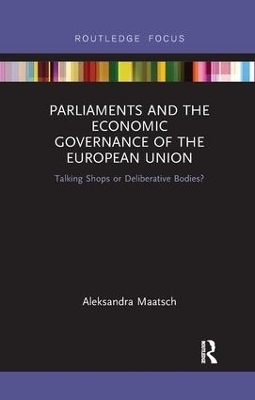
Parliaments and the Economic Governance of the European Union
Routledge (Verlag)
978-1-138-32644-6 (ISBN)
- Titel z.Zt. nicht lieferbar
- Versandkostenfrei innerhalb Deutschlands
- Auch auf Rechnung
- Verfügbarkeit in der Filiale vor Ort prüfen
- Artikel merken
Taking an interdisciplinary approach, In order to address that question the book employs an interdisciplinary approach and analyses (i) in which states parliaments’ formal powers in approval of anti-crisis measures were constrained, (ii) how parliamentary parties voted on the analysed measures, (iii) what were the dominant discourses of their proponents and opponents and (iv) which parties advocated neoliberal and which Keynesian measures.
This text will be of key interest to scholars, students and practitioners in European Union politics and studies, political parties and parliaments, European Economic governance and more broadly to European politics.
Aleksandra Maatsch is Chair of European and Multilevel Politics (Interim), University of Cologne, Germany.
1. Introduction
i.. National Parliaments in the Reform of European Economic Governance: Talking Shops or Deliberative Bodies?
ii. National Parliaments in the European Union: From De-Parliamentarisation to Re-Parliamentarisation.
iii. The Role of Parliaments in the European Union after the Lisbon Treaty
iv. How Do Parliaments Contribute to Closing the Legitimacy Gap?
v. Contents of the book
2. European Financial Crisis: Dominant Narratives and the Legal Status of Anti-Crisis Measures
i. The European Financial Crisis
ii. The Legal Status of Anti-Crisis Measures
3. Empowered or Disempowered? The Role of National Parliaments during the Reform of European Economic Governance
4. Drivers of Political Parties’ Voting Behaviour in European Economic Governance: The Ultimate Decline of the Economic Cleavage?
i. Introduction
ii. What Factors Explain Political Parties’ Voting Patterns on European Anti-crisis Measures? Literature Review and Hypotheses
iii. Research Design, Methodological Approach and the Database Used in This Study
iv. Empirical Findings
v. Discussion and Conclusions
5. Parliamentary Parties’ Discourses on Anti-Crisis Measures: Between Solidarity and Particularistic Interest
i. Introduction
ii. Analytical Framework
iii. Methodological Approach – Frame Analysis
iv. Discursive Support and Opposition: Dominant Patterns
v. Pragmatic and Idealistic Supporters
vi. Opponents: Nationalists and Anti-Austerians
vii. Conclusions
6. Macroeconomic Preferences of National Parliamentary Parties
i. Introduction
ii. Keynesianism and Neoliberalism
iii. Which Factors Account for Political Parties’ Positioning on Macroeconomic Policies? Hypotheses of This Study.
iv. Methodological Approach of this Study
v. Empirical Evidence
vi. Conclusions
7. Conclusions
| Erscheinungsdatum | 02.10.2018 |
|---|---|
| Reihe/Serie | Routledge Studies on Government and the European Union |
| Zusatzinfo | 9 Tables, black and white |
| Verlagsort | London |
| Sprache | englisch |
| Maße | 138 x 216 mm |
| Gewicht | 270 g |
| Themenwelt | Sozialwissenschaften ► Politik / Verwaltung ► Europäische / Internationale Politik |
| ISBN-10 | 1-138-32644-5 / 1138326445 |
| ISBN-13 | 978-1-138-32644-6 / 9781138326446 |
| Zustand | Neuware |
| Informationen gemäß Produktsicherheitsverordnung (GPSR) | |
| Haben Sie eine Frage zum Produkt? |
aus dem Bereich


